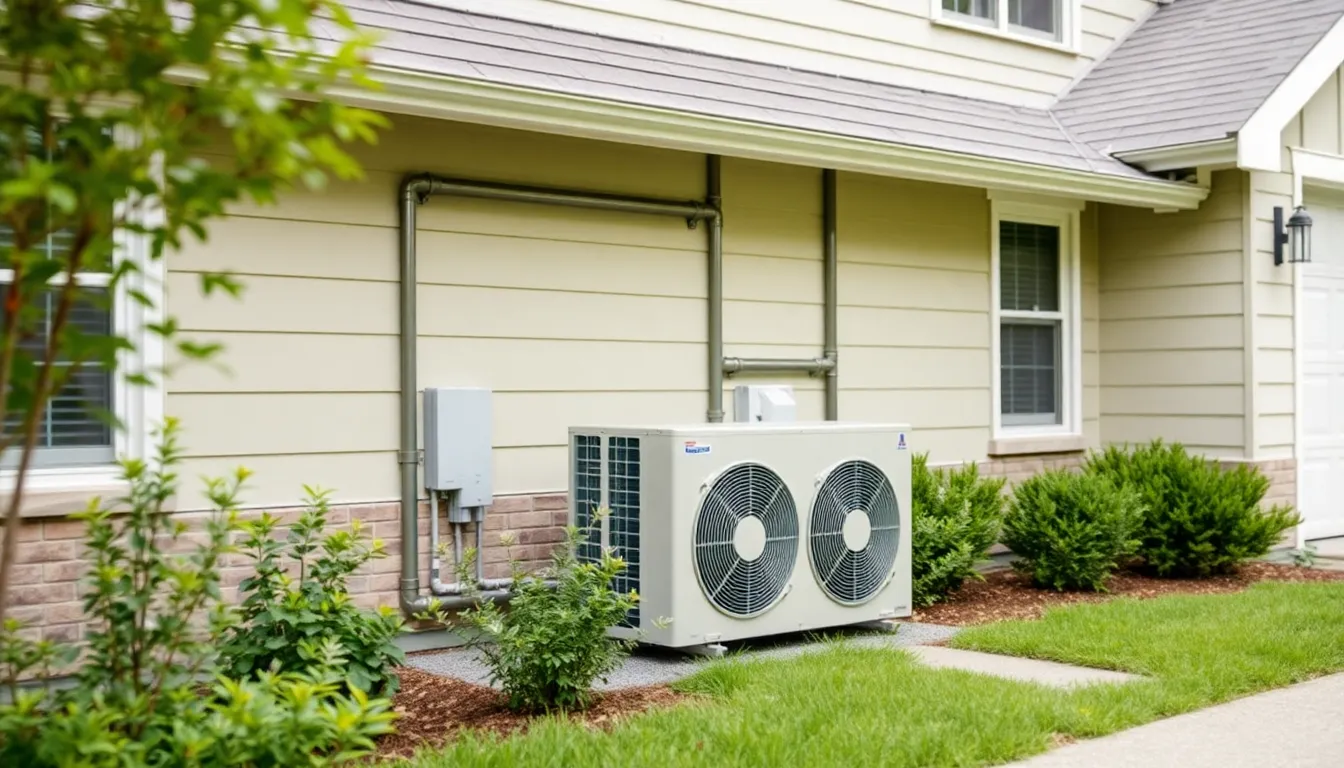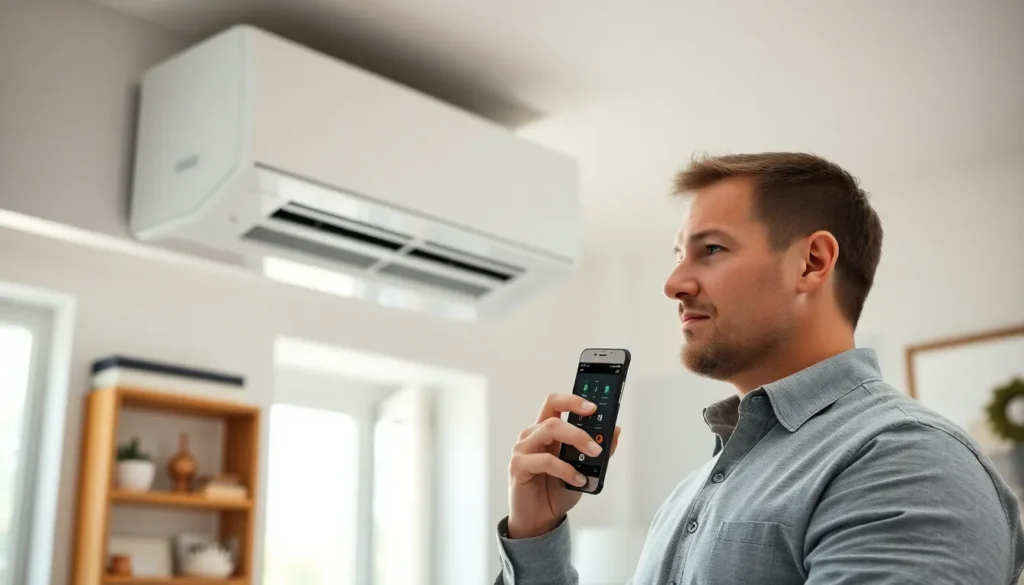Table of Contents
ToggleWhen it comes to keeping a home comfortable, an efficient HVAC system is the unsung hero. Imagine walking into your house after a long day and being greeted by a perfect climate, like a gentle hug from your favorite blanket. But without the right system, that cozy feeling can quickly turn into a battle against the elements.
Overview of Efficient HVAC Systems
Efficient HVAC systems stand at the forefront of modern home comfort. These systems use advanced technology to reduce energy consumption while maintaining optimal indoor climates. High-efficiency models often feature variable-speed motors, which adjust airflow based on demand, leading to significant energy savings.
Energy Star-rated units deliver superior performance and lower utility bills, making them an attractive option for homeowners. Advanced heat pumps can heat and cool spaces effectively, even in extreme temperatures. Smart thermostats enhance energy efficiency, allowing homeowners to control their systems remotely.
Proper sizing of the HVAC system plays a critical role in its efficiency. An oversized unit cools too quickly, resulting in increased humidity and discomfort. Conversely, an undersized system struggles to maintain temperatures, leading to excessive energy use.
Regular maintenance ensures longevity and efficiency. Tasks like changing filters and cleaning coils prevent systems from working harder than necessary. A professional inspection every year can identify potential issues before they escalate.
Investing in an efficient HVAC system benefits both comfort and finances. Upfront costs may seem high, but energy savings add up over time. Additionally, many utility companies offer rebates to encourage the adoption of high-efficiency models, further offsetting initial expenses.
With advancements in technology and an expanding range of options, homeowners can find HVAC solutions that meet both comfort and efficiency needs. Emphasizing sustainable practices, these systems contribute positively to the environment while delivering reliable performance.
Benefits of Efficient HVAC Systems

Efficient HVAC systems offer numerous advantages that enhance both comfort and savings. They play a crucial role in maintaining a pleasant indoor environment.
Energy Savings
Energy savings represent one of the most significant benefits of efficient HVAC systems. High-efficiency units consume less energy, resulting in lower utility bills. Studies show that Energy Star-rated systems can reduce energy usage by up to 30 percent compared to standard models. Homeowners can expect substantial annual savings when switching to these advanced systems. The initial investment typically pays off within a few years due to reduced monthly expenses. Additionally, some utility companies provide rebates for installing energy-efficient HVAC systems, further enhancing savings.
Environmental Impact
The environmental impact of efficient HVAC systems cannot be overlooked. By reducing energy consumption, these systems help lower greenhouse gas emissions. Installation of high-efficiency models contributes to less strain on power plants, which in turn leads to cleaner air. Transitioning to advanced systems supports sustainability efforts significantly. Efficient HVAC systems help decrease reliance on fossil fuels, promoting the use of renewable energy sources. Every efficient system installed plays a role in creating a healthier planet for future generations.
Types of Efficient HVAC Systems
Efficient HVAC systems come in various types, each designed to optimize energy use while providing comfort. Understanding these options helps homeowners make informed decisions.
Centralized Systems
Centralized systems serve entire buildings from a single location. Typically, these systems distribute conditioned air through ductwork, allowing for uniform temperature control. Boilers and chillers form the backbone of these setups, providing heating and cooling as needed. High-efficiency units reduce energy consumption significantly, often featuring advanced controls to optimize performance. Selecting the right size ensures comfort, as oversized systems lead to energy wastage, while undersized ones struggle to maintain desired temperatures. Homeowners can benefit from improved air quality when using these systems, particularly with regular filter changes and maintenance.
Ductless Mini-Split Systems
Ductless mini-split systems facilitate targeted heating and cooling. Comprising an outdoor unit and one or more indoor units, they eliminate the need for ductwork. Each indoor unit allows for independent temperature control in individual rooms, decreasing energy waste when spaces are not in use. These systems are known for high efficiency, often earning Energy Star ratings for their performance. Installation is typically less invasive than centralized systems, making them a popular choice for renovations or homes without existing ductwork. Many homeowners appreciate their quiet operation and flexibility in design, enhancing both comfort and aesthetic appeal throughout the space.
Key Features to Look For
Evaluating efficient HVAC systems requires attention to specific features. Understanding these elements enhances both comfort and energy savings.
SEER Ratings
SEER ratings indicate an HVAC system’s energy efficiency. A higher SEER rating corresponds to increased energy savings, with high-efficiency models reaching ratings above 16. Selecting systems with superior ratings can reduce energy usage by up to 30 percent compared to standard units. Energy Star certification identifies systems that meet or exceed efficiency criteria. Homeowners benefit financially as these units lower utility bills significantly over time. Considering long-term savings when choosing a system promotes informed investment.
Smart Technology Integration
Smart technology enhances the efficiency of HVAC systems significantly. Programmable thermostats allow precise temperature control based on a schedule. Homeowners can monitor their systems remotely with mobile apps, providing convenience and energy savings. Some systems offer integration with home automation systems, allowing seamless control through voice commands. Advanced features, like learning algorithms, adjust settings automatically based on user behavior. These innovations lead to optimized performance, reduced energy consumption, and improved indoor comfort levels.
Investing in an efficient HVAC system is a smart choice for any homeowner looking to enhance comfort and reduce energy costs. With advanced technology and features that promote energy savings and environmental sustainability, these systems provide a reliable solution for maintaining ideal indoor climates. Proper sizing and regular maintenance are key to maximizing the benefits of these systems. By choosing high-efficiency models and embracing smart technology, homeowners can enjoy significant savings while contributing to a greener planet. Embracing efficient HVAC solutions not only elevates home comfort but also supports a sustainable future.




